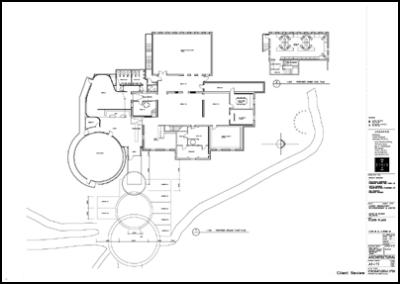Observatory Gets Support for its Redevelopment
Carter National Observatory Gets Support for its Redevelopment Plan

Click for Full Size Version (PDF)
Carter Observatory Floorplan.
CARTER OBSERVATORY
The National
Observatory of New Zealand
Media Release by the Carter Observatory Board
(Date 2006 December 19. For immediate release)
Carter National Observatory Gets Support for its Redevelopment Plan
The board of the Carter National Observatory is delighted that the funding package to refurbish the existing Carter Observatory buildings in the Botanical Gardens has been approved. The arrangements include the provision of funds from both the Ministry of Research Science and Technology (MORST) and the Wellington City Council (WCC).
Carter Board Chairman Richard Bentley comments ‘………the package will release in excess of $3million to fund the redevelopment of the existing Carter Observatory building into a more open and visitor friendly environment with improved planetarium facilities plus a substantially improved visitor experience around new themes and displays.’
‘In particular the redeveloped visitor experience will allow visitors to engage with the challenging and exciting newly unfolding knowledge around Maori and Polynesian astronomy, around Captain Cook’s astronomy measurements from New Zealand, around the very new discoveries about the creation of the Universe and the nature of time, space and matter, on the how life became established on Earth, on the existence of primitive life in the solar system and potentially more advanced life in our galaxy, and on the astronomers perspective on the Earth environment and global warming.’
It is proposed that the refurbishment will be implemented in with a significant change in the governance of the Carter Observatory (which is currently a Crown entity) including the creation of the new Carter National Observatory Trust and the repealing the Carter Observatory Act 1938.
The business of the Carter National Observatory moving forward will continue to include the hosting of school visits, the delivery of outreach schools programme which includes the presentation of a planetarium show in the new mobile planetarium, the distance education programme for NCEA levels and for primary school students, an enhanced focus on astronomy related events, and the continuation of the traditional adult education classes and telescope viewing.
ENDS


 Retail NZ: Retailers Call For Flexibility On Easter Trading Hours
Retail NZ: Retailers Call For Flexibility On Easter Trading Hours WorkSafe NZ: Worker’s Six-Metre Fall Prompts Industry Call-Out
WorkSafe NZ: Worker’s Six-Metre Fall Prompts Industry Call-Out PSGR: Has MBIE Short-Circuited Good Process In Recent Government Reforms?
PSGR: Has MBIE Short-Circuited Good Process In Recent Government Reforms? The Reserve Bank of New Zealand: RBNZ’s Five Year Funding Agreement Published
The Reserve Bank of New Zealand: RBNZ’s Five Year Funding Agreement Published Lodg: Veteran Founders Disrupting Sole-Trader Accounting in NZ
Lodg: Veteran Founders Disrupting Sole-Trader Accounting in NZ New Zealand Airports Association: Airports Welcome Tourism Marketing Turbocharge
New Zealand Airports Association: Airports Welcome Tourism Marketing Turbocharge



